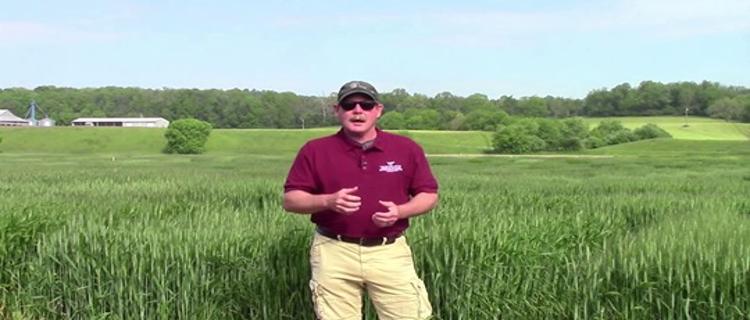
The recycling and land application of biosolids on family farms is a productive and beneficial reuse of by-product of an essential public service. Just ask Dr. Wade Thomason, Professor, Grain Crops Extension Specialist, with Virginia Tech, who for years has researched the use of organic nutrient sources to improve crop nutrition while maintaining the principles of land stewardship.
Dr. Thomason spoke with representatives of the Virginia Biosolids Council just after he participated in the 2020 Virginia Virtual Small Grain Field Day, an annual event presented by the Virginia Grain Producers Association to provide the latest research to farmers and agribusiness across the Commonwealth. This year, the event went virtual due to the Covid-19 pandemic. The Field Day focused on development and improvement of wheat and barley varieties specifically. We asked Dr. Thomason to speak to the research he has completed, focusing on fall application of biosolids to wheat in a corn, wheat and soybean rotation.
He discussed how the benefit of biosolids, as with any organic, is that nutrient supply mimics crop demand. The supply (of nutrients) is available when the demand (for nutrients) is present. This is especially beneficial in the coarse soils of eastern Virginia where leaching is more likely.
The slow release of biosolids is especially valuable, providing nutrients to crops to meet the demand as the nutrients will be utilized. While the land application of biosolids is productive across the Commonwealth, the application is especially valuable in the Eastern Valley, where a single application of commercial nitrogen fertilizer would not be as effective as biosolids due to the soil conditions which lend to leeching nutrients. Therefore, Dr. Thomason’s research is critical information used in nutrient management plans and their governance to ensure the most productive application of biosolids.
While Dr. Thomason has not observed widespread frost damage in small grains this spring, he sees it as a symptom of the cold and wet spring in Virginia, particularly in small grains. Farms across Virginia need some sunshine. And, once the sun comes out, the sun will spark those well managed and well suited biosolids and those nutrients will react, releasing the supply to meet demand accordingly.
Certainly, the utilization of nutrients is a critical discussion, and, ensuring that biosolids continue to have an economic and beneficial use in agriculture is critically important – particularly to those small farmers in Virginia who value biosolids. The importance of biosolids extends beyond crop and soil value to one of economics – providing benefit to farmers and the communities where they live.
